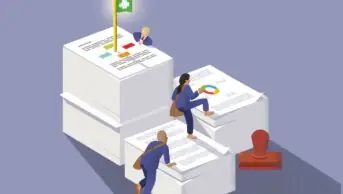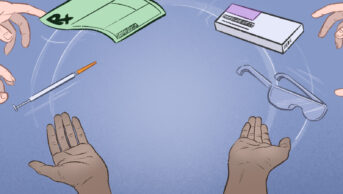There is a possibility that pharmacy technicians will hold two seats on the Royal Pharmaceutical Society’s Council. But will technicians aspire to become full professionals, independent of pharmacists?
Is it a dream partnership, pharmacists providing expertise of administering a profession and academic credibility, while technicians provide hands-on expertise and continuous presence? Or will technicians crave autonomy over dispensing: a prescrip-tion for, someday, a bitter divorce?
To achieve full professional status, thereis a prescription: a long recognised pathway, having 10 steps. This article outlines them. Generally, steps are in the same order. As steps progress, they become, broadly, more difficult, more at odds with pharmacists. But technicians must venture on that journey if they desire full professional status, independent from pharmacists.
First, however, note that “profession” has many meanings. Some are disparaging, such as “professional party goer” or “the oldest profession”. Libraries bulge with literature on the professions and offer numerous viewpoints, impossible to summarise in a few sentences. This article accepts that many occupations aspire to be professions but few succeed. Generally, the public know what a profession is and find the word useful. This article presumes that pharmacists form a profession and that technicians may, one day, wish to form their own profession, independent from pharmacists.
To achieve that, the first step is to start being a pharmacy technician full time, and not, for example, operating a till, part time. This step may already have been taken, at least in hospitals.
Training school
The second step is setting up a training school, including contact with universities. The corps of teachers who only teach technicians, not pharmacists, expands; standards are ratcheted up. The NVQ3 plus checking technician qualification is upgraded to NVQ5 or a pass degree, say BSc. If this seems unrealistic, remember that the government aims to make half the population graduates. A scientific knowledge base, differing in emphasis from that of pharmacists, should underpin dispensing skills in orderly minds. Perhaps computing, robotics and safe working systems may displace pharmacology and therapeutics.
Next (the third step), activists combine to form their own professional body. Typically, this follows much soul-searching, such as whether they are, truly, an independent occupation. Perhaps pharmacy technicians, assimilated in a friendly fashion and gifted a niche without a fight by the Society, would feel that separation at this stage was churlish. Pharmacy technicians may not gather sufficient confidence to separate until step 8 (see later).
Step 4 comprises a change in name to reduce identification with the previous, lower status occupation. Pathology laboratory technicians became medical laboratory scientific officers (MLSOs), for example. Possible new titles for pharmacy technicians include pharmaceutical technologist, pharmacy technical officer or pharmaceutist. The last would require pharmacists to relinquish one of their archaic, but still legally restricted, titles. The new title may attract a new type of person to the occupation. The new pharmaceutists, alas, may still be confused with the old pharmacy technicians.
Steps now become more challenging to achieve. Step 5 is to slough off their less technical work; it has become beneath the dignity of the occupation that was once called “pharmacy technician”. For example, placing dispensary stock on to shelves might become the job of an assistant. Changes flow through a chain of occupations. Doctors sloughed off routine prescribing to pharmacists who sloughed off routine dispensing to technicians who sloughed off routine shelf filling to assistants, and so on. One difficulty for technicians is deciding what to retain; it should not be so predictable that a computer or robot could perform it.
Step 6 requires that only those who have completed the new training are allowed in. This ultra modern training provides initiates with a system of knowledge. There are things — matters so complex — that initiates know but cannot tell. What once was a craft assumes a mantle including some mystery. That knowledge, however, must be separate from that of pharmacists.
Next (step 7) follows conflict between the old timers and the new blood. The old timers, happy to call themselves pharmacy technicians, subordinates of pharmacists, fight a rearguard action against the newcomers. The newcomers are proud of their new education, are keen on their new title and are evangelical about applying their new knowledge. They will travel to wherever they can do so.
The going gets tough in step 8. Now, they must jostle with other occupations to gain their own territory. They no longer want to piggyback as the junior partner in the supportive pharmacy family, but to be autonomous. They have been in the stultifying shadow of pharmacy for too long. They are as birds in a cage; pharmacists might think the group ‘Once-called-pharmacy-technicians’ sing for joy but really they weep. They relinquish their council seats and form their own association. That institution possesses a new label and that label makes new kinds of people. Recriminations between members of the old and new institutions may occur. Technicians realise, at last, that the invoice for occupying council seats has arrived and is large. They may,then, find pharmacists less encouraging, indeed antagonistic, maintaining their entrenched position by legal and informal means. They will fall out and chide and fightand nip bones. The victorious new group begins to wash from their blood the tincture of pharmacists; the new group rewrites its history so that pharmacists become bit players.
Change the law
In step 9, the group ‘Once-pharmacy-technicians’ lobby to change the law. Dispensing should be restructured so that they have a monopoly; sociologists call this “occupational closure”. It is a prize worth many battles. The new group is just an occupation on the make, wanting status and income, cynics claim.
After all this, the final step (step 10), superficially, seems an anticlimax. They compose, agree and take account of a code of ethics. It will address errors; one reason for introducing it late is that, until members have worked independently, they seldom know their particular frailties. At a deeper level, a change to a more concerned attitude for patients connected with personal liability for error, may emerge. Typically, codes also include not criticising other members to boost public trust. At last, members become a fully fledged profession.
This path is long and includes many obstacles; thousands of occupations try but few succeed. Determination, laser-focused upon the goal, may help. My hunch is that pharmacy technicians will not choose that journey. Perhaps their largest impediment is discovering a knowledge base in the efficient, methodical, scientific area of dispensing, a knowledge that pharmacists choose not to claim for themselves.
Today, sociologists choose not to presume to recommend the structure of future societies, but content themselves with humbler interpretation of how things are. Today, pharmacists as professionals and pharmacy technicians as subordinates, appear to beheading, together, into a reasonably harmonious partnership within the same institution.
That means that each is involved with, “boxed into”, the future of the other. They will sink or they will soar together. Perhaps, if either senior or junior partner wish some other future, they should speak now, or hold their peace for at least a generation.
Malcolm Brown is a pharmacist and sociologist from Beccles, Suffolk


